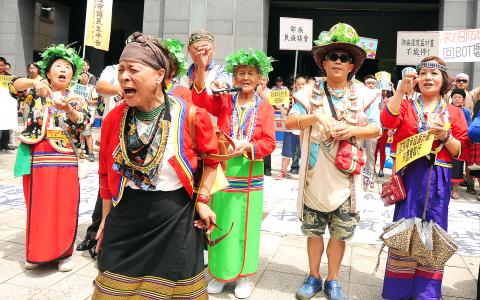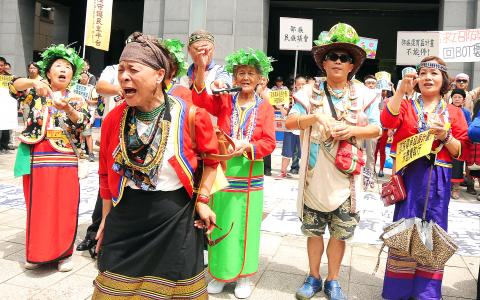An Environmental Impact Assessment (EIA) assembly yesterday afternoon conditionally approved a build-operate-transfer (BOT) resort project in Nantou, despite protests earlier in the day by Thao Aborigines, who argued that the project would occupy their traditional land near Sun Moon Lake (日月潭).
Late last month, when the project gained approval during an ad hoc EIA meeting, a number of representatives of the Thao people voiced their objections, saying that the approval of the project contravened the Aboriginal Basic Act (原住民基本法), as the developers did not consult the Thao Aborigines and gain their consent in advance.
In protests on Ketagalan Boulevard and later in front of the Environmental Protection Administration (EPA) in Taipei yesterday, protesters, in traditional Thao clothing, called on the EIA to reject the project with protest banners that read: “Protect Aboriginal homeland, stop the plunder,” “Rescue the Thao, reject the BOT project” and “Return our land, the Nantou Government is repressing the Thao.”

Photo: Liu Hsin-de, Taipei Times
Thao National Council chairman Banu Bagamumu said that they are angry with the developer for reporting to the Sun Moon Lake National Scenic Area Administration that the tribe members agreed to the project in an information session with residents living near Sun Moon Lake, and that the agency did not even confirm with Thao tribe members before reporting to the previous EIA meeting.
“The Thao tribe has the smallest population among the Aborigines in Taiwan, yet the government still represses it by robbing it of its land and resources,” said Taiwan First Nations Party founding chairman Runquan Lhkatafatu, a Thao, adding that they are against the project and refuse to accept promised employment positions at the resort.
They restated that the area surrounding Sun Moon Lake is the Thao’s traditional territory and that the Thao culture and living restoration park promised by the central government in 2008 should be built, adding that the BOT resort project review should be halted until it gains consent from the tribe members.

Photo: Liu Hsin-de, Taipei Times
During the EIA general assembly meeting, several representatives of the protestors blocked the projector screen when the developer made its report, in an attempt to stop the meeting.
However, the EIA committee members still decided to give conditional approval to the project through a voting session late in the afternoon.

A Taiwanese software developer has created a generative artificial intelligence (AI) model to help people use AI without exposing sensitive data, project head Huang Chung-hsiao (黃崇校) said yesterday. Huang, a 55-year-old coder leading a US-based team, said that concerns over data privacy and security in popular generative AIs such as ChatGPT and DeepSeek motivated him to develop a personal AI assistant named “Mei.” One of the biggest security flaws with cloud-based algorithms is that users are required to hand over personal information to access the service, giving developers the opportunity to mine user data, he said. For this reason, many government agencies and

The National Fire Agency on Thursday said a series of drills simulating a magnitude 8.5 earthquake would be held in September to enhance the government’s emergency response capabilities. Since earthquakes cannot be predicted, only by continuously promoting disaster prevention measures could Taiwan enhance its resilience to earthquakes, agency Director-General Hsiao Huan-chang (蕭煥章) said in a news release. The exercises would be held to mark annual National Disaster Prevention Day on Sept. 21, the aim of which is to test Taiwan’s preparedness and improve its earthquake resilience in case of a major temblor, Hsiao said. As part of those drills, an earthquake alert would

DEFENSE: The National Security Bureau promised to expand communication and intelligence cooperation with global partners and enhance its strategic analytical skills China has not only increased military exercises and “gray zone” tactics against Taiwan this year, but also continues to recruit military personnel for espionage, the National Security Bureau (NSB) said yesterday in a report to the Legislative Yuan. The bureau submitted the report ahead of NSB Director-General Tsai Ming-yen’s (蔡明彥) appearance before the Foreign and National Defense Committee today. Last year, the Chinese People’s Liberation Army (PLA) conducted “Joint Sword-2024A and B” military exercises targeting Taiwan and carried out 40 combat readiness patrols, the bureau said. In addition, Chinese military aircraft entered Taiwan’s airspace 3,070 times last year, up about

STRICTER ENFORCEMENT: Taipei authorities warned against drunk cycling after a sharp rise in riding under the influence, urging greater public awareness of its illegality Taipei authorities have issued a public warning urging people not to ride bicycles after consuming alcohol, following a sharp rise in riding under the influence (DUI) cases involving bicycles. Five hundred and seven people were charged with DUI last year while riding YouBikes, personal bicycles, or other self-propelled two-wheelers — a fourfold increase from the previous year, data released by the Taipei Police Department’s Traffic Division showed. Of these, 33 cases were considered severe enough to be prosecuted under “offenses against public safety,” the data showed. Under the Road Traffic Management and Penalty Act (道路交通管理處罰條例), bicycles — including YouBikes and other